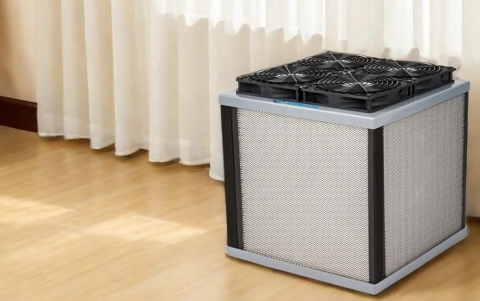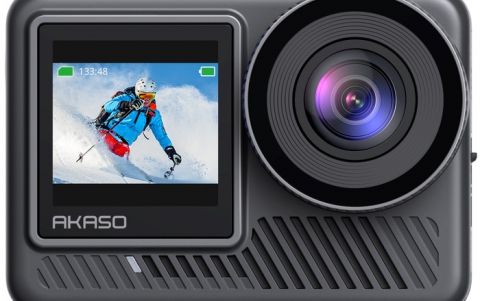Yamaha CRW2200E CD-RW
6. CDR Tests
CDR Tests
The Yamaha CRW2200E is the first recorder that support 12-20x (P-CAV) writing speeds. Yamaha has added in the new drive anti-coaster technology called "SafeBURN" which eliminates buffer underrun.
Let's see a comparison chart between different various recording technologies:
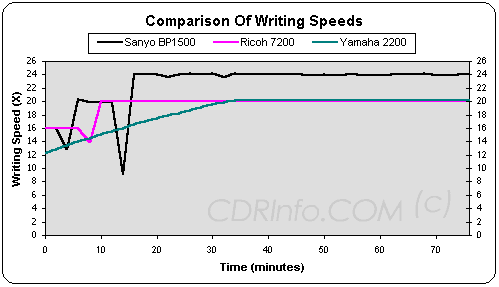
The Yamaha drive starts writing at 12x (0 minutes) and continues increasing writing speed up to 20x (around 32mins) and writes at 20x till the end of the disc. The competitor drives use Zone-CLV and as you can see are faster. In the following table we can see the average writing speed of the Yamaha 2200E, Ricoh 7200 and Sanyo's BP1500P, according to the CD Speed 99:
|
CDR-W drives
|
Average Writing Speed (X)
|
|
Yamaha CRW2200
|
18.44
|
|
Ricoh 7200
|
19.50
|
|
Sanyo BP1500P
|
22.58
|
As you might have expected, the Sanyo BP1500P is the fastest drive with almost 22.58X average writing speed, Ricoh MP7200A comes second with 19.50X and Yamaha 2200E third with 18.44X. The question now is do these writing speeds apply in real life tests? Don't rush in conclusions. The test results vary from the tested media and there were some cases in which Sanyo 24x was the slowest among the 3 tested drives... More on this later.

Yamaha claims that their drive stays below 6000rpm and the CD Speed 99 writing test confirmed it. The 2200E starts at 6060 and ends at 4260rpm. This gives Yamaha an advantage over the competition since lower RPM mean less noise for the drive and less vibrations. The Ricoh 7200 starts at 7950 and ends at 4235rpm. The drive makes one big jump, when it passes from 16x CLV to 20x CLV (at 6-10minutes), from 6830 to 7820 rpm. Last the Sanyo BP1500P has the biggest rpm ,as expected due to it's 24x writing speed. It starts at 7932rpm, makes the first jump from 16x to 20x CLV at 2-6minutes, makes the second jump from 20x to 24x at 12-16minutes and continues to write at 24x speed till the end. The problem is that in both jumps the drive reaches almost 9000rpm that causes noise. In short words: More RPM means higher writing speed and higher noise from the drive.
 -
Procedure: We tested the Yamaha CRW2200E with Nero v5.5.1.8, Ahead InCD
v2.13, CloneCD v3.0.0.20 and, Padus DJ v3.00.780 softwares. We used various
of media for performing our tests: Verbatim 74min (16x and 16x+) & 80min
(16x), Mitsui 74min (16x), Prodisc 80min (16x), Ricoh 74min (8X) and with TDK/Plextor/Verbatim
74min HS-RW. We did notice some problems with Prodisc 80min 16x media, which
were corrected with a newer beta firmware revision (B.0C)...
-
Procedure: We tested the Yamaha CRW2200E with Nero v5.5.1.8, Ahead InCD
v2.13, CloneCD v3.0.0.20 and, Padus DJ v3.00.780 softwares. We used various
of media for performing our tests: Verbatim 74min (16x and 16x+) & 80min
(16x), Mitsui 74min (16x), Prodisc 80min (16x), Ricoh 74min (8X) and with TDK/Plextor/Verbatim
74min HS-RW. We did notice some problems with Prodisc 80min 16x media, which
were corrected with a newer beta firmware revision (B.0C)...
Yamaha said that "...Current firmware 1.0B (and 1.0C) lowers the speed
to 8X when the inserted disc has no ID code in ATIP information and CRW2200
recognizes it as "unknown" even when Optimum Write Speed Control is
OFF. Next version of firmware will allow users to write at the speed manually
set by user at his own risk, as long as OPC is successful. If the OPC fails
before writing, the drive simply refuses to write and let the disc unwritten..."
- CD-R Tests:
We created a "DataCD" job with data slightly more than 74mins
(74:03:65). We burned the same job with all 4 CDR-W drives:

As you can see, the Yamaha CRW2200E has the biggest burning time since it's 16x writing speed is not CLV but P-CAV. The drive needs 324secs finish the burn when Plextor PX-W1610A needs 312secs. That's 12secs time gap. The difference from the rest drives seems to be much lower (7-8secs).
- 80min CDs:
In our normal burning tests the 80min CD contains slightly more than 80min
data (80:01:47):

The Yamaha CRW2200E is the slower drive since it gives the higher recording time (348secs). The PleXWriter again gives the lowest recording time and both Ricoh and Sanyo drives follows....
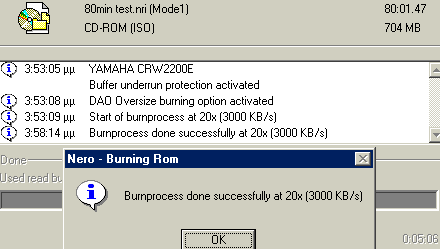
Comparing the different recording technologies we see that the Yamaha 2200E is about 32secs faster than a 16x CLV recorder, 15secs slower than MP7200A and 40secs slower than Sanyo BP1500P. Those time differences seem dropping down slight in the 80minute CDs:

Here the Yamaha 2200E is faster 28secs than a 16x CLV recorder, 22secs slower than MP7200A and 34secs slower than Sanyo BP1500P. The above results are the best you can get (from the tested media). As you will read later you must use 20x or 24x certified media else you will have possibly longer burning time than the expected one...
- Overburning Tests:
The Yamaha supports overburning as Nero states... or not? The drive can
overburn but when we tried to burn 90 and 99minutes CDs we had problems. When
the drive reached the end it locked, and after a while the PC also locked. Note
that it failed to read 99minute CDRs. Yamaha said officially that they don't
support both 90 and 99minute CDs. Maybe a coming firmware revision fixes this
problem also.
- CD-Text Results:
We created several AudioCDs with CD-Text enabled. The Yamaha CRW2200E managed
to write/read them (and CD-Text) without any problems.
- CloneCD Tests:
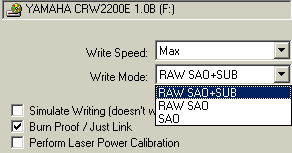 The
CloneCD v3.0.0.20 reports that the drive doesn't support the DAO-RAW feature.
In first, we were disappointed but after Yamaha insisted that the drive DOES
support DAO-RAW we tried a little tweak and managed to force CloneCD see the
drive's DAO-RAW capabilities.
The
CloneCD v3.0.0.20 reports that the drive doesn't support the DAO-RAW feature.
In first, we were disappointed but after Yamaha insisted that the drive DOES
support DAO-RAW we tried a little tweak and managed to force CloneCD see the
drive's DAO-RAW capabilities.
 Since
CloneCD allowed us to test the DAO-RAW feature we performed our usual backup
tests and we confirmed that the drive supports fully DAO-RAW writing mode (made
backups of Safedisc 1.0, LaserLock 1/2 and SecuROM 2). We suspect that in a
newer version, the CloneCD author will fully support the drive's features. Note
also that CloneCD recognized that drive has anti-coaster technology (SafeBURN)
- even the Burn Proo/JustLink box was ticked.
Since
CloneCD allowed us to test the DAO-RAW feature we performed our usual backup
tests and we confirmed that the drive supports fully DAO-RAW writing mode (made
backups of Safedisc 1.0, LaserLock 1/2 and SecuROM 2). We suspect that in a
newer version, the CloneCD author will fully support the drive's features. Note
also that CloneCD recognized that drive has anti-coaster technology (SafeBURN)
- even the Burn Proo/JustLink box was ticked.
- SD2 Support:
For the SD2 test we used the "No One Lives For Ever" CD title.
We used the Yamaha CRW2200E both as reader/writer. The produced backup didn't
play using the same driver or any drive we tested. Therefore also the new Yamaha
model cannot produce SD2 working backups.
- 8cm mini CDs:
The Yamaha supports 8cm CDs both in reading/writing. As Yamaha said the
drive will not support business cards or weird shape CDs.
- Buffer Underrun tests:
 Yamaha
has added "SafeBURN" anti-coaster technology. This system will protect
users from buffer underrun and from what our test results showed worked very
good. We made several on-the-fly copies with CloneCD v3.0x series without any
problems and we also stopped PC (with ctrl+shift+del) several times. In all
cases the drive continued writing!
Yamaha
has added "SafeBURN" anti-coaster technology. This system will protect
users from buffer underrun and from what our test results showed worked very
good. We made several on-the-fly copies with CloneCD v3.0x series without any
problems and we also stopped PC (with ctrl+shift+del) several times. In all
cases the drive continued writing!




